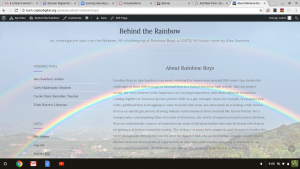This past week offered a lot of great development for our project. Most notably, Olivia Durant from the Webster Public Library responded to my inquiry on her memory of the case, and she was able to find the name of the man who challenged Rainbow Boys: Reverend Morse! Unfortunately we don’t have a first name or a church affiliation, but it is nice to put a name to our challenger and have a lead on how we could eventually contact him. Though time is dwindling, I’m hoping to look through an old yellow pages for “Morse,” or even make quick calls to the handful of churches in Webster asking if a Reverend Morse ever was affiliated with their church. In other opposition perspective news, Liz tracked down a D&C opinion page on the challenge of Rainbow Boys and featured two responses that supported Webster’s decision to remove the book. These voices against the general trend of our project (librarians, teachers, students, the author, Liz and I) all in favor of displaying the book, demonstrate the polarizing nature of exposing children to a world different than the one their parents grew up in. And even the tone in which the responses handle LGBT issues, noting that “perversion has reached the schoolhouse,” reflects how much has changed since this challenge in 2006, as it’s hard to imagine a major newspaper giving that perspective a platform in 2018. Between Reverend Morse, these submissions to the D&C, and comments from the former Webster administration, Liz and I should hopefully be able to grasp the perspective of the Rainbow Boys opposition.

Additionally, Liz and I finally put some content on the site! For the most part, uploading content is a painless process. As is often true, getting things set up in terms of site theme and content framework proved to be the most challenging part, and our considerable amount of interviews and analysis already recorded make filling in the details a reasonable task. I have a good amount of analysis to go along with the Trish Warren interview, but because our conversation was nearly 20 minutes and the rest of our interviews are shorter Q&As over email, we can expect that page to be longer than most. I’m wondering if some of the liberties I took in analysis are acceptable there; how much of our own voice can show? Additionally, we’ve nearly completed our bio page and “About Rainbow Boys” page. I ran into some issues with the text editor and my ability to add media to our pages and Leah offered me some suggestions (different browser, clearing data cache) which temporarily worked. But by the time the issue came back, the all-powerful Liz had discovered what I hope to be a permanent solution which is typing in the web address into your search bar to ensure the connection is labeled “secure.” When the browser thinks the connection is “secure,” the site works more quickly and opens up more features. Looking forward, I’m hoping to hear back from Olivia on how her perspective on the incident has changed since 2006, as she implied that it did. We’re also hoping to find and contact Reverend Morse and continue to fill in the details we already know.

